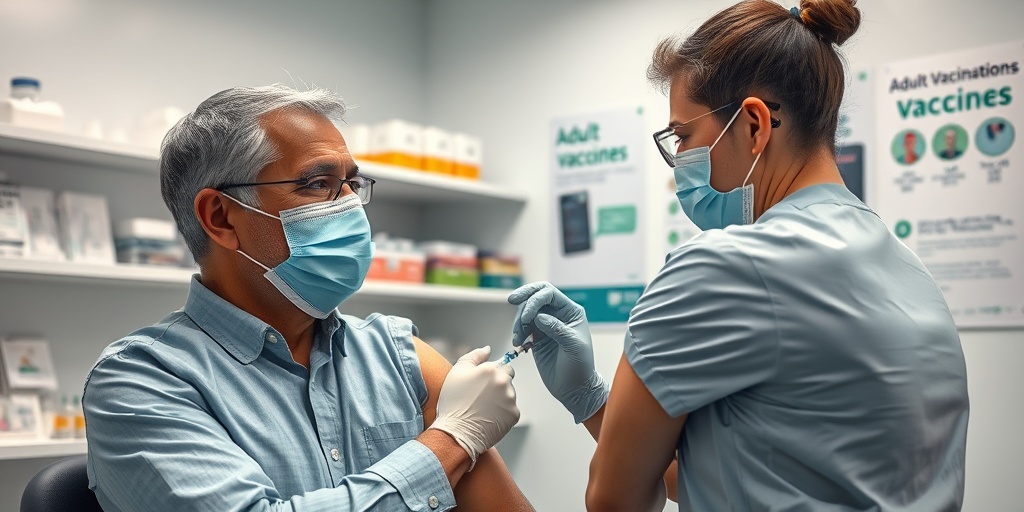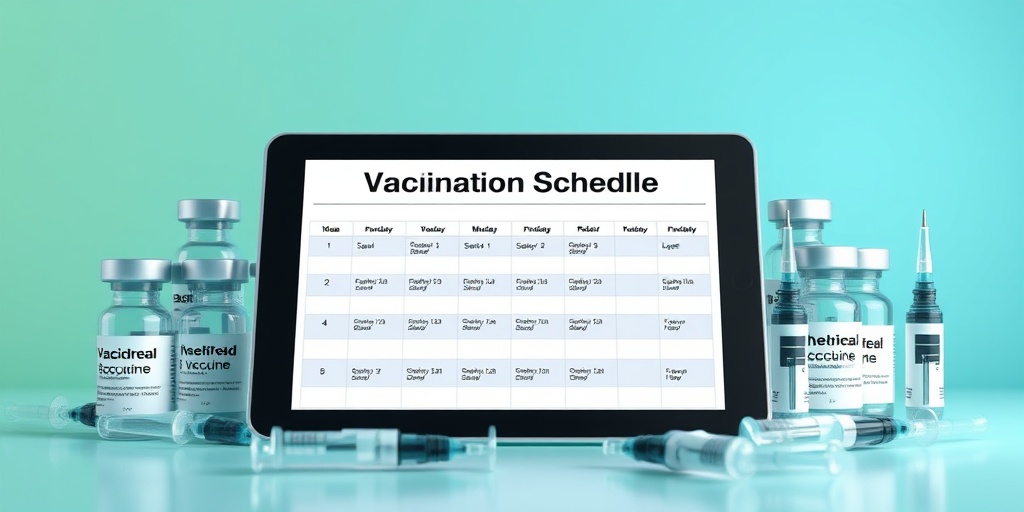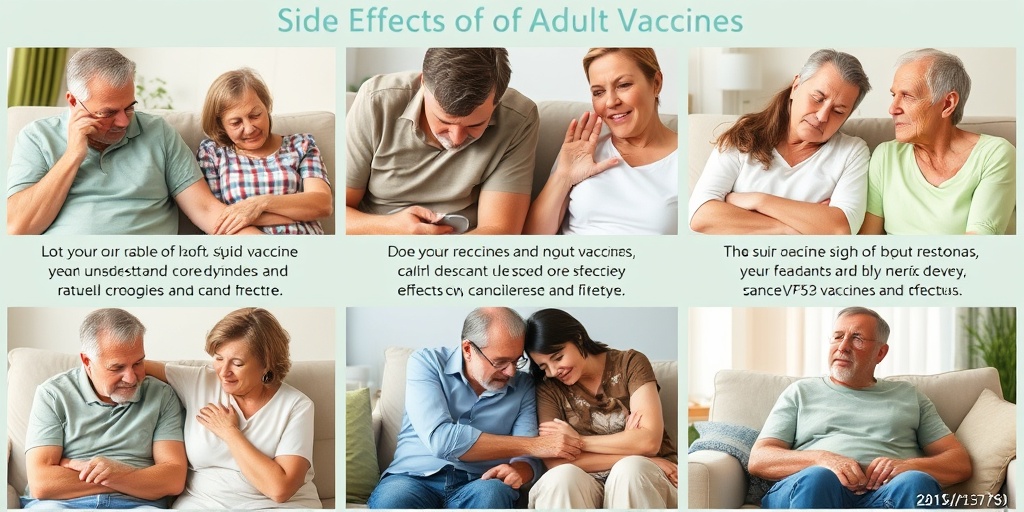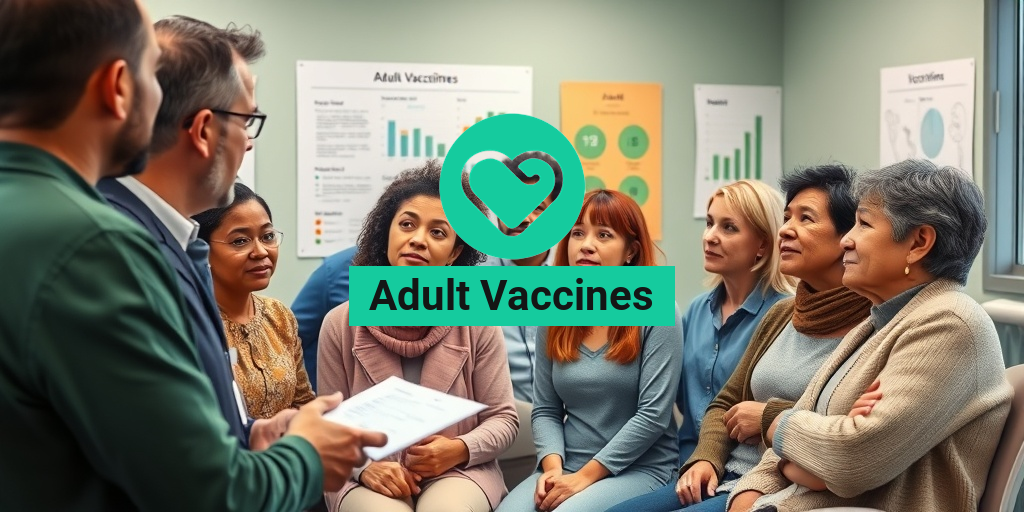What Are Adult Vaccines?
Adult vaccines are immunizations specifically designed for individuals aged 18 and older. While many people associate vaccines primarily with children, it’s crucial to understand that adults also require vaccinations to maintain their health and prevent the spread of infectious diseases. Adult vaccines can protect against various illnesses, including influenza, pneumonia, hepatitis, and even certain cancers.
The Importance of Adult Vaccination
Vaccination is not just a childhood concern; it plays a vital role in adult health as well. As we age, our immune systems may weaken, making us more susceptible to infections. Additionally, some diseases can have more severe consequences for adults than for children. For instance, the flu can lead to serious complications in older adults, making the flu vaccine essential.
Common Adult Vaccines
Here’s a list of some of the most common vaccines recommended for adults:
- Influenza (Flu) Vaccine: Recommended annually, especially for those over 50 or with chronic health conditions.
- Pneumococcal Vaccine: Protects against pneumonia and is recommended for adults over 65 or those with certain health issues.
- Tdap (Tetanus, Diphtheria, Pertussis) Vaccine: A booster is recommended every 10 years.
- Shingles Vaccine: Recommended for adults over 50 to prevent shingles and its complications.
- Hepatitis A and B Vaccines: Important for adults at risk of exposure to these viruses.
- HPV Vaccine: Recommended for adults up to age 26 to prevent certain cancers.
These vaccines can significantly reduce the risk of serious health issues and are often covered by health insurance plans. If you’re unsure about which vaccines you need, consider consulting a healthcare professional or visiting resources like Yesil Health AI for personalized advice.
Why Vaccines Matter for Adults
Vaccines are a cornerstone of public health, and their importance extends well into adulthood. Here are several reasons why adult vaccines matter:
1. Protection Against Serious Diseases
Many diseases that can be prevented through vaccination can lead to severe health complications or even death. For example, the shingles vaccine not only prevents shingles but also reduces the risk of postherpetic neuralgia, a painful condition that can occur after a shingles outbreak. Similarly, the flu vaccine can prevent hospitalizations and deaths, particularly among older adults.
2. Community Immunity
Vaccination is not just about individual protection; it also contributes to community immunity, or herd immunity. When a significant portion of the population is vaccinated, it helps protect those who cannot be vaccinated, such as individuals with certain medical conditions. This is especially important in preventing outbreaks of diseases like measles and whooping cough.
3. Reducing Healthcare Costs
Preventing diseases through vaccination can lead to significant healthcare savings. Treating illnesses can be costly, both in terms of medical expenses and lost productivity. By getting vaccinated, adults can help reduce the overall burden on the healthcare system, which is beneficial for everyone.
4. Staying Up-to-Date with Vaccination Schedules
Many adults are unaware of the vaccines they may need as they age. Keeping track of your vaccination schedule is essential. The CDC provides guidelines on recommended vaccines for adults, which can vary based on age, health status, and lifestyle. Regular check-ups with your healthcare provider can help ensure you stay up-to-date.
5. Addressing Emerging Health Threats
With the emergence of new health threats, such as COVID-19, the importance of adult vaccination has never been clearer. Vaccines can help mitigate the impact of these diseases and protect vulnerable populations. Staying informed about new vaccines and boosters is crucial for maintaining public health.
In conclusion, adult vaccines are a vital aspect of health that should not be overlooked. They protect not only individual health but also the health of the community. If you have questions about which vaccines you need or how to get them, consider reaching out to a healthcare professional or visiting Yesil Health AI for reliable information. Remember, staying healthy is a lifelong journey, and vaccinations are an essential part of that journey! 💉🌟

Common Adult Vaccines
Vaccination is not just for children; it plays a crucial role in maintaining health throughout adulthood. As we age, our immune systems may weaken, making us more susceptible to various diseases. Here’s a look at some of the common adult vaccines that can help protect you and your loved ones.
1. Influenza Vaccine
The flu vaccine is recommended annually for adults. It helps reduce the risk of flu-related complications, which can be severe, especially for older adults or those with underlying health conditions. The vaccine is typically available in the fall, just before flu season peaks. 🦠
2. Tdap Vaccine
The Tdap vaccine protects against three diseases: tetanus, diphtheria, and pertussis (whooping cough). Adults should receive a booster every 10 years, and it’s especially important for those who are around infants, as whooping cough can be particularly dangerous for young children.
3. Shingles Vaccine
Shingles, caused by the varicella-zoster virus, can lead to painful rashes and long-term nerve pain. The CDC recommends that adults aged 50 and older receive the shingles vaccine, which can significantly reduce the risk of developing this condition. 💉
4. Pneumococcal Vaccine
This vaccine protects against pneumonia and other serious infections caused by the pneumococcus bacteria. Adults over 65, or those with certain health conditions, should discuss this vaccine with their healthcare provider to determine the best schedule for vaccination.
5. Hepatitis A and B Vaccines
Hepatitis A and B vaccines are recommended for adults who are at increased risk of exposure to these viruses. This includes travelers to certain countries, healthcare workers, and individuals with specific health conditions. These vaccines can help prevent serious liver diseases.
6. Measles, Mumps, and Rubella (MMR) Vaccine
While often associated with childhood vaccinations, adults who have not received the MMR vaccine or are unsure of their vaccination status should consider getting vaccinated, especially in light of recent outbreaks. This is particularly important for those in close contact with infants or healthcare settings.
7. COVID-19 Vaccine
The COVID-19 vaccine remains essential for adults, especially with the emergence of new variants. Staying up-to-date with booster shots can help protect against severe illness and hospitalization. Check with your local health department for the latest recommendations. 🌍
Vaccination Schedule for Adults
Understanding the vaccination schedule for adults is crucial for maintaining optimal health. Here’s a general guideline to help you keep track of your vaccinations:
Annual Vaccinations
- Influenza Vaccine: Annually, preferably before flu season.
Every 10 Years
- Tdap Vaccine: A booster every 10 years.
Age-Specific Vaccinations
- Shingles Vaccine: Recommended for adults aged 50 and older.
- Pneumococcal Vaccine: Recommended for adults over 65 or those with certain health conditions.
Risk-Based Vaccinations
- Hepatitis A and B Vaccines: Based on risk factors such as travel, occupation, or health conditions.
- MMR Vaccine: For adults who are unsure of their vaccination status or have not been vaccinated.
COVID-19 Vaccination
Stay informed about the latest recommendations for COVID-19 vaccinations and boosters, as guidelines may change based on emerging data and variants.
It’s essential to consult with your healthcare provider to create a personalized vaccination plan that fits your health needs and lifestyle. Regular check-ups can help ensure you stay on track with your vaccinations and maintain your health as you age. Remember, prevention is always better than cure! 💪

Adult Vaccine Benefits
Vaccination is not just for children; it plays a crucial role in maintaining health throughout adulthood. Adult vaccines are essential for preventing various diseases and ensuring long-term health. Here are some of the key benefits of staying up-to-date with your vaccinations:
1. Disease Prevention
One of the primary benefits of adult vaccines is their ability to prevent serious diseases. Vaccines such as the influenza vaccine, shingles vaccine, and tetanus-diphtheria-pertussis (Tdap) vaccine protect against infections that can lead to severe health complications. For instance, the shingles vaccine can significantly reduce the risk of developing shingles and its associated pain, while the flu vaccine can lower the chances of hospitalization during flu season.
2. Protection for Vulnerable Populations
Vaccination not only protects the individual but also helps shield vulnerable populations, such as infants, the elderly, and those with compromised immune systems. By getting vaccinated, adults contribute to herd immunity, which reduces the spread of infectious diseases within the community. This is particularly important for diseases like measles and whooping cough, which can be severe in young children.
3. Reduced Healthcare Costs
Investing in adult vaccines can lead to significant savings in healthcare costs. Preventing diseases through vaccination reduces the need for medical treatments, hospitalizations, and long-term care associated with vaccine-preventable illnesses. For example, the cost of a single vaccine is often much lower than the expenses incurred from treating a disease that could have been prevented.
4. Improved Quality of Life
Staying healthy through vaccination allows adults to maintain an active lifestyle. By preventing diseases, vaccines help individuals avoid missed workdays, social activities, and family gatherings. This contributes to a better quality of life and overall well-being.
5. Staying Informed and Prepared
Regular vaccinations keep adults informed about their health status and encourage proactive health management. Many healthcare providers recommend an adult vaccines schedule that includes routine check-ups and vaccinations, ensuring that individuals stay on track with their immunizations.
Side Effects of Adult Vaccines
While the benefits of adult vaccines are substantial, it’s also important to be aware of potential side effects. Understanding these can help individuals make informed decisions about their health. Here’s what you need to know:
1. Common Side Effects
Most adult vaccines are well-tolerated, and side effects are generally mild and temporary. Common side effects include:
- Pain or swelling at the injection site
- Fatigue
- Headache
- Muscle aches
- Fever
These symptoms usually resolve within a few days and are a sign that the body is building protection against the disease.
2. Rare Side Effects
In rare cases, adults may experience more serious side effects. These can include:
- Allergic reactions (e.g., hives, difficulty breathing)
- Neurological effects (e.g., Guillain-Barré syndrome, though this is extremely rare)
If you experience any severe reactions, it’s crucial to seek medical attention immediately. However, it’s important to remember that the risk of serious side effects is much lower than the risk of complications from the diseases that vaccines prevent.
3. Managing Side Effects
To manage mild side effects, consider the following tips:
- Apply a cool compress to the injection site to reduce swelling.
- Stay hydrated and rest if you feel fatigued.
- Over-the-counter pain relievers, such as ibuprofen or acetaminophen, can help alleviate discomfort.
Always consult with your healthcare provider if you have concerns about side effects or if you’re unsure about which vaccines are appropriate for you.
4. Importance of Communication
Before receiving any vaccine, it’s essential to discuss your medical history and any concerns with your healthcare provider. They can provide personalized advice and ensure that you receive the most appropriate vaccines based on your health status and lifestyle.
In conclusion, while adult vaccines come with some potential side effects, the benefits far outweigh the risks. Staying informed and proactive about vaccinations is key to maintaining good health throughout adulthood. 💉✨

Who Should Get Vaccinated?
Vaccination is not just for children; it plays a crucial role in maintaining health throughout adulthood. Understanding who should get vaccinated can help protect not only individual health but also community health. Here’s a breakdown of different groups of adults who should consider getting vaccinated:
1. Adults Over 50
As we age, our immune systems weaken, making us more susceptible to various diseases. Adults over 50 should prioritize vaccines such as:
- Shingles Vaccine: This vaccine can significantly reduce the risk of shingles and its complications, including postherpetic neuralgia.
- Pneumococcal Vaccine: Protects against pneumonia, meningitis, and bloodstream infections.
- Flu Vaccine: Annual flu shots are essential to prevent seasonal influenza, which can be severe in older adults.
2. Adults with Chronic Health Conditions
Individuals with chronic conditions like COPD, diabetes, or heart disease are at a higher risk for complications from vaccine-preventable diseases. Recommended vaccines include:
- Tdap Vaccine: Protects against tetanus, diphtheria, and pertussis (whooping cough), which can be particularly dangerous for those with respiratory issues.
- Hepatitis B Vaccine: Important for adults with liver disease or those at risk of exposure.
3. Pregnant Women
Pregnancy alters the immune system, making vaccinations crucial for both the mother and the baby. Recommended vaccines include:
- Flu Vaccine: Safe during pregnancy and helps protect both mother and baby.
- Tdap Vaccine: Recommended during the third trimester to protect newborns from whooping cough.
4. Healthcare Workers
Healthcare professionals are at a higher risk of exposure to infectious diseases. Vaccines that are particularly important for them include:
- MMR Vaccine: Protects against measles, mumps, and rubella.
- Hepatitis B Vaccine: Essential for those who may come into contact with blood or bodily fluids.
5. Travelers
If you’re planning to travel, especially internationally, certain vaccines may be required or recommended based on your destination. Common vaccines for travelers include:
- Typhoid Vaccine: Recommended for travel to areas with poor sanitation.
- Yellow Fever Vaccine: Required for entry into certain countries in Africa and South America.
Myths About Adult Vaccines
Despite the proven benefits of vaccines, several myths persist that can deter adults from getting vaccinated. Let’s debunk some of the most common misconceptions:
Myth 1: Vaccines Are Only for Children
This is one of the most prevalent myths. In reality, adults need vaccines too. Many vaccine-preventable diseases can affect adults, and immunity from childhood vaccines can wane over time. Regular vaccinations help maintain immunity and protect against outbreaks.
Myth 2: Vaccines Cause More Harm Than Good
Concerns about vaccine safety are common, but extensive research shows that vaccines are safe and effective. Serious side effects are rare, and the benefits of vaccination far outweigh the risks. Vaccines undergo rigorous testing before approval and continuous monitoring afterward.
Myth 3: Natural Immunity Is Better Than Vaccine-Induced Immunity
While natural immunity can be strong, it often comes at a cost—contracting the disease itself. Vaccines provide a way to build immunity without suffering from the disease and its potential complications. For example, the risks associated with diseases like measles or whooping cough can be severe, making vaccination a safer option.
Myth 4: Once Vaccinated, You’re Done for Life
Many adults believe that once they receive a vaccine, they are protected for life. However, some vaccines require boosters to maintain immunity. For instance, the Tdap vaccine is recommended every 10 years, and the flu vaccine is needed annually due to changing virus strains.
Myth 5: Vaccines Are Only Necessary During Outbreaks
Vaccination is essential even when there are no outbreaks. Maintaining high vaccination rates in the community helps prevent outbreaks and protects those who cannot be vaccinated due to medical reasons. This concept is known as herd immunity.
Understanding who should get vaccinated and dispelling myths surrounding adult vaccines is crucial for public health. Staying informed and proactive about vaccinations can lead to healthier communities and individuals. 💉

Frequently Asked Questions about Adult Vaccines
What are Adult Vaccines?
Adult vaccines are immunizations recommended for individuals aged 18 and older to protect against various infectious diseases. These vaccines help maintain immunity and prevent outbreaks of diseases that can affect adults.
Why are Adult Vaccines important?
Vaccines play a crucial role in public health by preventing the spread of infectious diseases. They not only protect the individual but also contribute to herd immunity, which helps protect those who cannot be vaccinated.
What is the recommended Adult Vaccines schedule?
The adult vaccines schedule varies based on age, health status, and previous vaccination history. Common vaccines include:
- Influenza (Flu) vaccine annually
- Tdap (Tetanus, Diphtheria, Pertussis) booster every 10 years
- Shingles vaccine for adults over 50
- Pneumococcal vaccine for adults over 65 or those with certain health conditions
- MMR (Measles, Mumps, Rubella) if not previously vaccinated
Are there specific Adult Vaccines for individuals with COPD?
Yes, adults with Chronic Obstructive Pulmonary Disease (COPD) are often recommended to receive specific vaccines, including:
- Pneumococcal vaccine
- Influenza vaccine
These vaccines help reduce the risk of respiratory infections that can exacerbate COPD symptoms.
Where can I find Adult Vaccines near me?
You can find adult vaccines near you by checking with local health departments, pharmacies, or healthcare providers. Many clinics and hospitals also offer vaccination services.
What are the Adult Vaccines recommended by the CDC?
The Centers for Disease Control and Prevention (CDC) provides guidelines on recommended adult vaccines. These include:
- Influenza
- Tdap
- Shingles
- Pneumococcal
- Hepatitis A and B
- MMR
Do adults need a measles vaccine booster?
Yes, adults who are unsure of their vaccination history or have not received the MMR vaccine may need a booster, especially during outbreaks. It’s essential to consult with a healthcare provider for personalized advice.
What vaccines should adults over 50 consider?
Adults over 50 should consider the following vaccines:
- Shingles vaccine
- Pneumococcal vaccine
- Annual influenza vaccine
These vaccines help protect against diseases that are more prevalent in older adults.
Can I get multiple Adult Vaccines at once?
Yes, it is generally safe to receive multiple adult vaccines during the same visit. However, it’s best to discuss this with your healthcare provider to ensure it aligns with your health needs.
What should I do if I experience side effects from a vaccine?
Common side effects from vaccines may include soreness at the injection site, mild fever, or fatigue. If you experience severe side effects or have concerns, contact your healthcare provider for guidance.
How can I stay updated on Adult Vaccines?
To stay informed about adult vaccines, regularly check resources like the CDC website, consult with your healthcare provider, and follow local health department announcements.




